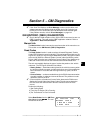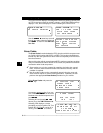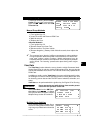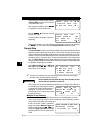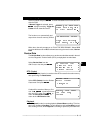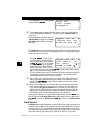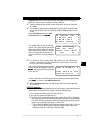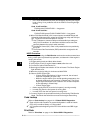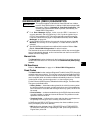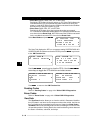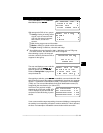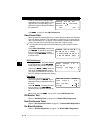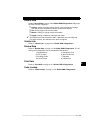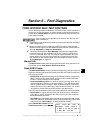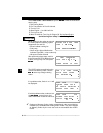
• • • • • • • • • • • • • • • • • • • • • • • • • • • • • • • • • • • • • • • • • • • • • • • • • • • • • • • • • 5 – 9
GM Enhanced (OBD II) Diagnostics
5
GM ENHANCED (OBD II) DIAGNOSTICS
This system applies to GM vehicles manufactured from 1996 to
present. Some GM vehicles in 1994 and 1995 were equipped with
this system. Refer to “
Appendix A - Data Link Connectors
". GM
vehicles manufactured from 2000 to present automatically use
Global OBD II Diagnostics.
✓ If an
Error Message
displays, make sure the OBD II connector is
securely attached, and the ignition key is ON. Cycle the ignition key to
OFF for 10 seconds, then ON. This may be required to reset the computer.
If required, select YES to try again. If the problem still exists, refer to “
Error
Messages
” on page 8-2.
✓ On the initial link to the vehicle, the scan tool checks the status of the
I/M
Monitors
and conveys it to the operator, no matter which function is
selected.
✓ Specific GM Enhanced functions are defined in this section. Refer to “
Sec-
tion 4 - Global OBD II Diagnostics
" for other functions.
The first time the scan tool communicates with the vehicle, the communication
type is automatically detected, and is used until the scan tool is turned OFF or
another vehicle is diagnosed.
Manual Info
The
Manual Info
function, the last one in the function list, instructs the user what
section of the manual to use. This section covers
GM Enhanced (OBD II) Diag-
nostics
.
I/M Readiness
Refer to “
I/M Readiness
” on page 4-1 of
Global OBD II Diagnostics
.
Read Codes
The
Read Codes
function retrieves Diagnostic Trouble Codes (DTCs) from the
vehicle’s computer module(s). This function can be performed with the KOEO
or KOER. These codes cause the computer to illuminate the Malfunction Indi-
cator Lamp (MIL) when an emission-related or driveability fault occurs. The MIL
is also known as the “service engine soon” or “check engine” lamp.
For the Enhanced OBD II system, GM added a third code type, Transient codes.
The types are defined below:
•
History Codes
— intermittent codes placed in the vehicle’s memory when
the trouble originally occurred, and will remain there even if the trouble has
been corrected. If no trouble after 50 engine warm-up cycles, the DTC will
be erased.
•
Current Codes
— codes transmitted through the PCM’s data stream when
a trouble condition is active and cannot be erased. The problem must be
repaired to remove the DTC.
•
Transient Codes
— indicates the current code has been set at least once
but possibly not enough to cause a history code to be stored.
In GM Enhanced OBD II, if DTCs are present, then three conditions (or sta-
tuses) accompany each DTC definition.
•
MIL
(Malfunction Indicator Lamp): REQUESTED or NOT REQUESTED
An emissions-related DTC is requesting the MIL (Check Engine/Service
Engine Soon) to be ON.
IMPORTANT



